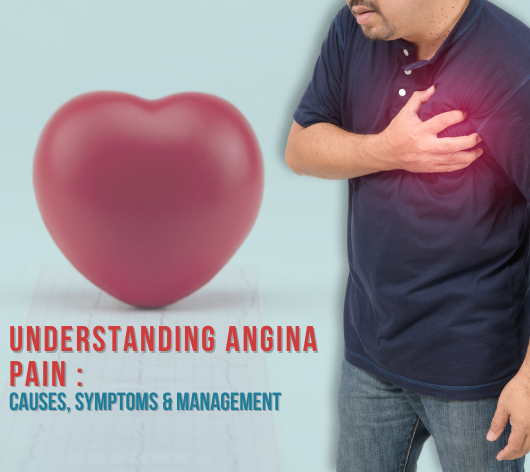
Understanding Angina Pain: Causes, Symptoms, and Management
Introduction
Angina pain, often described as chest discomfort or pressure, is a common symptom of coronary artery disease. While it can be alarming, understanding the causes, symptoms, and management of angina pain can help individuals navigate through this condition with confidence. In this blog, we'll explore what angina pain is, its underlying causes, typical symptoms, and effective management strategies.
What is Angina Pain?
Angina pain occurs when the heart muscle does not receive enough oxygen-rich blood due to narrowed or blocked coronary arteries. This insufficient blood flow can result from the buildup of plaque (atherosclerosis) within the arteries, restricting the flow of blood to the heart.
Causes of Angina Pain:
The primary cause of angina pain is coronary artery disease (CAD), a condition characterised by the narrowing or blockage of the coronary arteries. Other factors that can contribute to angina pain include:
2. High cholesterol levels
3. Smoking
4. Diabetes
5. Obesity
6. Lack of physical activity
Symptoms of Angina Pain:
The symptoms of angina pain may vary from person to person, but commonly include:
1. Chest discomfort or pressure: Often described as a squeezing, tightness, or heaviness in the chest.
2. Pain in the arms, neck, jaw, shoulder, or back: Discomfort may radiate to these areas.
3. Shortness of breath: Difficulty breathing, especially during physical activity or stress.
4. Nausea, dizziness, or lightheadedness: Some individuals may experience these symptoms along with chest discomfort.
Management of Angina Pain:
Managing angina pain involves a combination of lifestyle changes, medication, and medical procedures. Here are some effective strategies:
1. Lifestyle Modifications: Adopting a heart-healthy lifestyle, including regular exercise, a balanced diet low in saturated fats and cholesterol, maintaining a healthy weight, quitting smoking, and managing stress, can help reduce angina pain and improve overall heart health.
2. Medications: Medications such as nitroglycerin, beta-blockers, calcium channel blockers, and statins may be prescribed to relieve symptoms, reduce the frequency of angina episodes, and lower the risk of complications.
3. Medical Procedures: In some cases, medical procedures such as angioplasty and stenting or coronary artery bypass surgery may be recommended to improve blood flow to the heart and reduce angina symptoms.
Conclusion:
Angina pain is a warning sign that the heart is not receiving enough oxygen-rich blood, often due to underlying coronary artery disease. While it can be frightening, effective management strategies can help individuals alleviate symptoms, reduce the risk of complications, and improve overall heart health.
If you experience symptoms of angina pain, it's essential to seek medical attention promptly. With proper diagnosis and treatment, individuals can live active, fulfilling lives while managing angina pain effectively. Remember, prioritising heart health is key to living a longer, healthier life.
FAQs About Angina Pain:
What causes angina pain?
- Angina pain is primarily caused by reduced blood flow to the heart muscle due to narrowed or blocked coronary arteries, typically resulting from coronary artery disease (CAD).
What triggers angina pain?
- Angina pain can be triggered by physical exertion, emotional stress, extreme temperatures, heavy meals, or smoking, as these activities increase the heart's demand for oxygen-rich blood.
How is angina pain diagnosed?
- Diagnosis of angina pain involves a thorough medical history review, physical examination, and diagnostic tests such as electrocardiogram (ECG/EKG), stress tests, echocardiogram, and coronary angiography.
Can angina pain be prevented?
- While certain risk factors for angina pain, such as age and family history, cannot be modified, adopting a heart-healthy lifestyle, including regular exercise, a balanced diet, maintaining a healthy weight, and avoiding smoking, can help prevent or reduce the risk of angina pain.
When should I seek medical attention for angina pain?
- It's crucial to seek immediate medical attention if you experience new or worsening chest discomfort, especially if it is accompanied by symptoms such as shortness of breath, nausea, dizziness, or lightheadedness, as these could indicate a heart attack or other serious cardiac condition.
